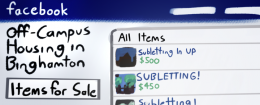
We are starting a new semester, taking new courses and adjusting to new schedules, but chances are, if you lived on campus last semester, you’re still living on campus — whether you like it or not.
Binghamton University Residential Life doesn’t make it easy for students to break their on-campus housing lease; students must be transferring, graduating, studying abroad or joining the military to do so.
Those students who want to move off campus for the spring can’t, and off-campus students whose rooms they’d fill are scrambling to find subletters.
The Editorial Board has discussed the University’s unreasonably early housing sign-up deadlines before, and inevitably, this issue comes up again, especially when trying to justify why so many students are struggling to sublet their off-campus rooms. The early deadline causes problems for students on both sides — students who live on campus often rush into signing up for housing without knowing for sure if they want to continue living on campus, and students who wish to live off campus are rushed into signing leases before all the “best” places are taken.
But what happens when a student living on campus experiences something that makes them want to live off campus for the following semester? And what happens when a student who has already signed a lease decides to study abroad, graduate early or move elsewhere?
The product of these situations is a deluge of students who want to sublet their rooms, with few students who are actually able to take over these leases. The University’s housing contract locks students in to living on campus for the entire school year, save for three reasons, which the University outlines in the contract: withdrawing from the University, attending a study abroad program or transferring out of the University. Thus, students living on campus who are interested in living off campus are generally unable to take over leases for students who are trying to sublet their off-campus rooms.
These problems all boil down to the University’s early housing deadline. If the deadline were later in the fall semester or in the spring, students would have a better idea of their plans for the future. In 2014, Suzanne Howell, the associate dean of students and the director of residential life and student housing, wrote a letter to the editor in which she explained some reasons why the housing deadline was changed to the fall semester beginning that year, after previously being during the spring semester.
“We believe that the timeline change is in the best interest of our students,” she wrote.
But if the University changed the deadline in order to increase on-campus signups, and ResLife is generally unwilling to let students break their on-campus leases, it is clear that this is not truly in our best interest. Presently, students who are struggling to sublet their rooms, often having to continue paying rent even when they are not occupying their rooms — simply because students who live on campus are unable to move. The University has created a vicious cycle for students. Rather than matching the needs and patterns of the students it is supposed to serve, it is attempting to dictate them.
ResLife should, at the very least, take a case-by-case approach when deciding whether or not to let students break their on-campus housing lease. Students and their families encounter life events that could change their finances, personal relationships and physical and mental health. The University should be more aware of these possible — and realistic — life changes and how they can affect students’ housing arrangements.
If the administration truly wants to act with our best interest in mind, it should reconsider the current housing policies.


